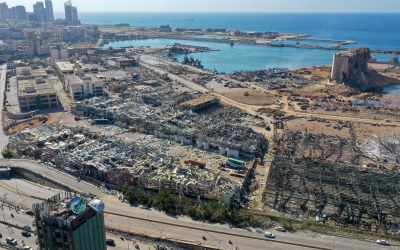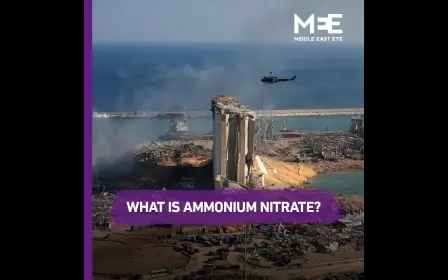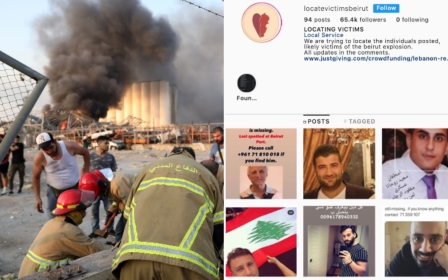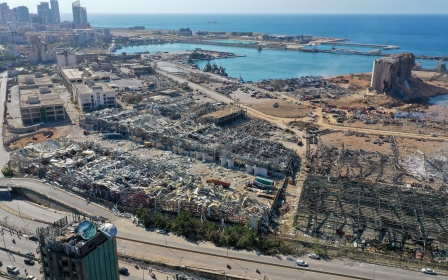Beirut explosion: How the world has responded
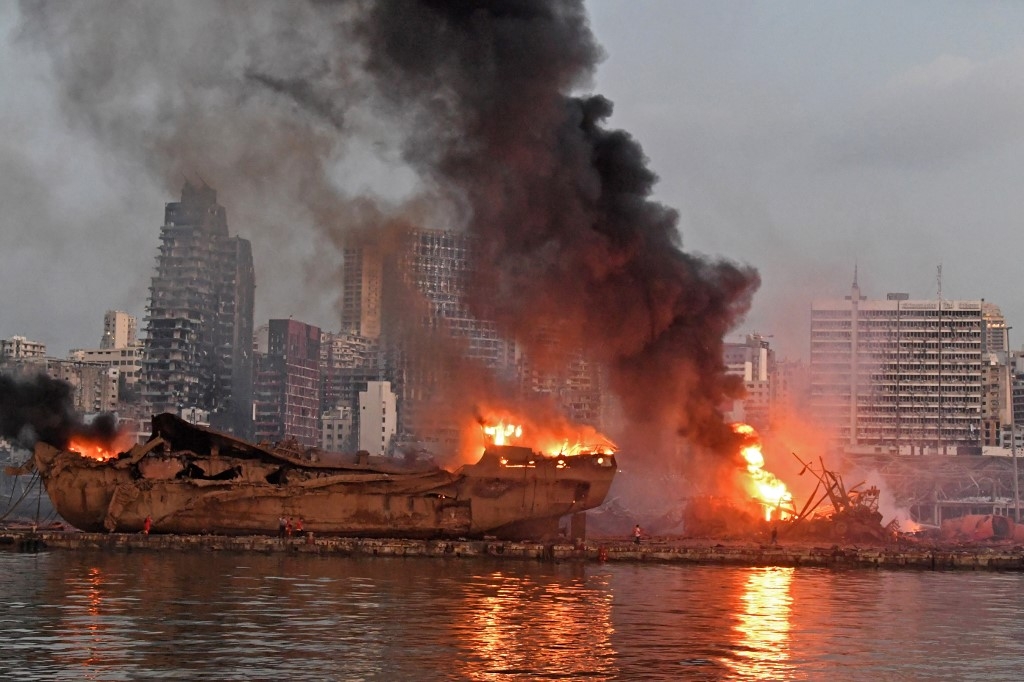
The international community has by and large expressed its solidarity with Lebanon after Tuesday’s explosion at a warehouse in the Beirut port that killed at least 100 people and injured nearly 4,000.
Below are details of how some countries reacted, and the aid they pledged to Lebanon:
France
President Emmanuel Macron's office said France would send 55 security personnel to Lebanon and six tonnes of health equipment, while around 10 emergency doctors would also fly to Beirut.
The French presidency announced on Wednesday that Macron would be heading to Beirut on Thursday.
"France is always on the side of Lebanon and the Lebanese people. It is ready to offer assistance depending on the needs expressed by Lebanese authorities," Foreign Minister Jean-Yves Le Drian said on Twitter.
United States
President Donald Trump on Tuesday described the massive explosion as a possible attack, despite no immediate evidence corroborating this claim. Statements by Lebanese leaders have so far indicated that the blast was likely caused by highly explosive material that had been stored at warehouses in the capital for years.
"The United States stands ready to assist Lebanon," Trump said at a White House briefing of Tuesday's explosion.
"It looks like a terrible attack."
When asked later about his depiction of the explosion, Trump said that he had met with some US generals who felt the blast was not "some kind of a manufacturing explosion type of event". He told reporters that according to these unnamed generals "they seem to think it was an attack. It was a bomb of some kind."
The Pentagon referred questions to the White House.
Two US officials, speaking on the condition of anonymity, said it was unclear where Trump was receiving his information but that initial information did not appear to show that the explosion was an attack.
The officials said the information so far tracked closer to what Lebanese officials had publicly stated. They added that it was still early and could change as time went on.
United Kingdom
Prime Minister Boris Johnson said Britain stood ready to provide any support it could to help Beirut.
"The pictures and videos from Beirut tonight are shocking," Johnson wrote on Twitter on Tuesday. "All of my thoughts and prayers are with those caught up in this terrible incident.
"The UK is ready to provide support in any way we can, including to those British nationals affected."
Ammonium nitrate: What is it and how did it get to Beirut's port?
+ Show - HideThere are still many details surrounding the cause of the explosion that devastated much of Beirut on Tuesday that remain murky and unexplained.
However, the Lebanese government has so far indicated that they believe the enormous blast to have been the result of 2,700 tonnes of the chemical compound ammonium nitrate left lying in a warehouse in Beirut port since 2013.
Middle East Eye has compiled a quick guide to the destructive compound and the circumstances surrounding its fateful detonation on Tuesday.
What is ammonium nitrate?
Ammonium nitrate is an industrial chemical commonly used for fertilisers, but also as an explosive, often used in mining.
The chemical, known by the formula NH4NO3, is a naturally white crystalline solid and is often known as saltpetre.
Under most conditions ammonium nitrate is not necessarily dangerous and is relatively stable - it can even be used to smother a fire.
However, if contaminated it can become highly volatile.
What previous incidents have there been?
The most notorious confirmed ammonium nitrate explosion prior to Tuesday was the 1947 Texas City Disaster.
On 16 April 1947, at the Port of Texas City, 2,300 tonnes of ammonium nitrate exploded, killing almost 500 people.
More than 5,000 people were injured and at least 1,000 buildings levelled in the surrounding area.
It was the deadliest industrial accident in US history and resulted in the first-class action lawsuit against the US government on behalf of 8,485 victims.
A more recent incident involving ammonium nitrate took place in 2015 when a series of explosions at a chemical plant in the Chinese port city of Tianjin killed 173 people and injured 798.
Among the blasts at the port was the detonation of 800 tonnes of ammonium nitrate.
Eventually Chinese courts handed jail sentences to 49 government officials and warehouse executives and staff over their involvement in circumventing and loosening safety standards enabling the storage of dangerous chemicals.
How did the chemical end up in the port?
The chemicals originally arrived at Beirut's port on board a Russian-owned cargo vessel flying a Moldovan flag in September 2013.
The shipping monitoring organisation ShipArrested.com at the time reported that "upon inspection of the vessel by Port State Control, the vessel was forbidden from sailing. Most crew except the master and four crew members were repatriated and shortly afterwards the vessel was abandoned by her owners after charterers and cargo concern lost interest in the cargo".
According to documents posted online and seen by Al Jazeera, the ship's dangerous cargo was then offloaded and placed in hangar 12.
Numerous letters were reportedly sent by customs officials, including former director of Lebanese customs Shafik Merhi, to judges between 2014 and 2017 asking for guidance on what to do with the chemicals.
One letter sent in 2016 - which noted there had been "no reply" to previous requests - said the ammonium nitrate was being kept in "unsuitable" conditions.
"In view of the serious danger of keeping these goods in the hangar in unsuitable climatic conditions, we reaffirm our request to please request the marine agency to re-export these goods immediately to preserve the safety of the port and those working in it, or to look into agreeing to sell this amount," said the letter.
Another letter was sent by Lebanese customs administration director general Badri Daher on 27 October 2017 urging a resolution to the situation, in light of "the danger ... of leaving these goods in the place they are, and to those working there".
On Wednesday, British Junior Education Minister Nick Gibb told BBC radio that Britain was working urgently to decide what technical and financial help it could provide to Lebanon.
"There will be further announcements this morning and later today about what support we will be providing to Lebanon," he added.
When asked about speculation about the causes of the blast, Gibb told Sky News: "The Lebanese authorities are of course investigating the cause of that tragedy and before we have the results of that inquiry it is premature to speculate."
Iran
President Hassan Rouhani said Iran was ready to send medical aid to Lebanon, help treat the injured and provide other necessary medical assistance.
"We hope that the circumstances of this incident will be determined as soon as possible and that peace will return to Beirut," state television quoted him as saying.
Foreign Minister Mohammad Javad Zarif tweeted on Tuesday: "Our thoughts and prayers are with the great and resilient people of Lebanon. As always, Iran is fully prepared to render assistance in any way necessary. Stay strong, Lebanon."
Saudi Arabia
Saudi Arabia's foreign ministry said on Tuesday that it was following with great concern the consequences of Beirut's port explosion, according to the state news agency.
The statement also affirmed the kingdom's full support and solidarity with the Lebanese people.
Turkey
Turkey's Humanitarian Relief Foundation (IHH) is helping in the search for survivors, digging through debris to look for people and recover bodies. The group has also mobilised a kitchen at a Palestinian refugee camp in Lebanon to deliver food to those in need, said Mustafa Ozbek, an Istanbul-based IHH official.
"We are providing assistance with one ambulance to transfer patients. We may provide help according to the needs of the hospital," he said.
Earlier, Turkish President Tayyip Erdogan spoke with Lebanese counterpart Michel Aoun about the massive explosion and said Turkey was ready to provide humanitarian aid as needed, the presidency said.
Palestine
Palestinian leaders have expressed their condolences to the Lebanese people after the explosion. Palestinian Authority President Mahmoud Abbas has expressed his solidarity and said Palestine was ready to offer help to Lebanon.
Meanwhile, Hamas leader in Gaza Ismail Haniyeh called the Lebanese president, prime minister and the parliament speaker and offered condolences.
Israel
Israel offered humanitarian assistance to Lebanon on Tuesday, Israeli Defence Minister Benny Gantz said.
"Israel has approached Lebanon through international security and diplomatic channels and has offered the Lebanese government medical and humanitarian assistance," a written statement from Gantz and Foreign Minister Gabi Ashkenazi said.
Meanwhile, an Israeli official said that Israel has nothing to do with the explosion.
"Israel has nothing to do with the incident," the official said on condition of anonymity as cited by Reuters.
Lebanon does not recognise the state of Israel. Israel occupied southern Lebanon for more than 15 years until 2000, and continues to occupy the Lebanese Shebaa Farms. Israel also waged a devastating war with Lebanon's Hezbollah movement in 2006, during which its army destroyed much of Beirut's southern suburbs.
Egypt
Egyptian President Abdel Fattah el-Sisi expressed his condolences to the Lebanese people in a phone call with Lebanese President Aoun on Wednesday morning, and said his country was ready to provide all possible aid to Lebanon.
“My sincere condolences and sympathy to our brothers in Lebanon, the government and the people, over the painful explosion that took place today in the Lebanese capital Beirut," Sisi tweeted on Tuesday. "Praying to God for a speedy recovery for the injured, and may He grant the victims patience and solace.”
Sisi also ordered for two planes filled with medical aid to be sent to Lebanon, Egyptian media reported.
Qatar
Qatar state news agency QNA said the country had dispatched a first military plane carrying medical aid on Wednesday.
Three more planes were to follow later in the day, containing two field hospitals of 500 beds each equipped with respirators and other necessary medical supplies.
Kuwait
Kuwait has delivered medical aid and other essentials.
The Ministry of Health said Kuwaiti aid arrived in Lebanon by military plane on Wednesday morning and the Kuwaiti Red Crescent said it would offer whatever help Lebanon needed, Kuwait television reported.
Tunisia
Tunisia’s president, Kais Saied, and political parties have expressed solidarity with Lebanon following the attack.
Tunisian media reported that Saied had ordered for two military aircraft carrying medical supplies, equipment and food to be sent to Lebanon immediately.
Russia
Russia's emergencies ministries said it was sending five planes carrying medical equipment, a field hospital and medical personnel. It said all medical staff travelling to Beirut would be equipped with personal protective gear in light of the coronavirus pandemic.
Netherlands
The Netherlands is sending a specialised search and rescue team to Lebanon consisting of 67 doctors, nurses, firemen and police officers to assist in the search for survivors trapped under rubble.
Cyprus
Cyprus said it stood ready to offer medical aid to neighbouring Lebanon after the massive explosion.
"Cyprus is ready to accept injured persons for treatment and send medical teams if required," Cypriot Foreign Minister Nikos Christodoulides told state broadcaster CyBC on Wednesday.
Tuesday's explosion was heard throughout Cyprus, which lies about 160km away.
Christodoulides said the Cypriot embassy in Beirut, which was closed at the time of the blast, was extensively damaged.
Middle East Eye delivers independent and unrivalled coverage and analysis of the Middle East, North Africa and beyond. To learn more about republishing this content and the associated fees, please fill out this form. More about MEE can be found here.


